Related Research Articles
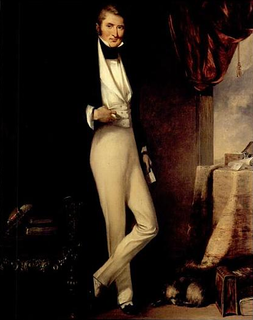
William Jardine was a Scottish physician, opium merchant and trader who co-founded the Hong Kong based conglomerate Jardine, Matheson & Co. Following his return to England from the Far East, between 1841 and 1843, he was Member of Parliament for Ashburton representing the Whig party.
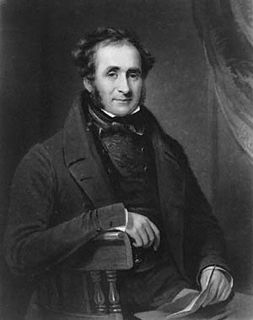
Sir James Nicolas Sutherland Matheson, 1st Baronet, FRS, was a Scottish Tai-Pan. Born in Shiness, Lairg, Sutherland, Scotland, he was the son of Captain Donald Matheson. He attended Edinburgh's Royal High School and the University of Edinburgh. He and William Jardine went on to co-found the Hong Kong-based trading conglomerate Jardine Matheson & Co. that became today's Jardine Matheson Holdings.
The Keswick family are a business dynasty of Scottish origin associated with the Far East region since 1855 and in particular the conglomerate Jardine Matheson.

Dent & Co. or Dent's, was one of the wealthiest British merchant firms, or Hongs, active in China during the 19th century. A direct rival to Jardine, Matheson & Co, together with Russell & Co., these three companies are recognised as the original Canton Hongs active in early Colonial Hong Kong.
A hong originally designates both a type of building and a type of Chinese merchant intermediary in Guangzhou, Guangdong, China, in the 18–19th century, specifically during the Canton System period.
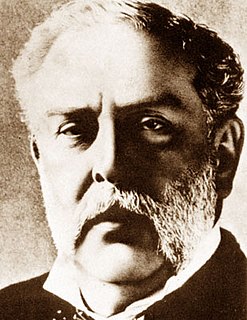
William Keswick was a British Conservative politician and businessman, patriarch of the Keswick family, an influential shipping family in Hong Kong associated with Jardine Matheson Holdings.
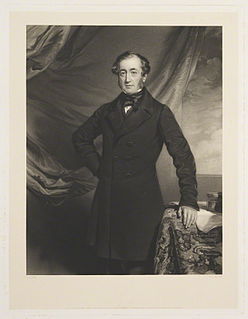
John Abel Smith was a British Member of Parliament (MP) for Chichester and Midhurst.
William Herbert Vacher was a prominent British merchant and banker who was a member of the Shanghai Municipal Council, a chairman of the British Chamber of Commerce in Shanghai, founding manager of the London branch of The Hongkong and Shanghai Banking Corporation.

Russell & Company was the largest American trading house of the mid-19th century in China. The firm specialised in trading tea, silk and opium and was eventually involved in the shipping trade.
Hollingworth Magniac (1786–1867) was a merchant and connoisseur of medieval art. He briefly ran the free trading firm of Magniac & Co. which was later to become Jardine, Matheson & Co., one of the largest trading houses in Asia during the 19th century.

Jardine, Matheson & Co., later Jardine, Matheson & Co., Ltd., forerunner of today's Jardine Matheson Holdings, was a Far Eastern company founded in 1832 by Scotsmen William Jardine and James Matheson as senior partners. Trafficking opium in Asia, while also trading cotton, tea, silk and a variety of other goods, from its early beginnings in Canton, in 1844 the firm established its head office in the new British colony of Hong Kong then proceeded to expand all along the China Coast.

Jardine Matheson Holdings Limited is a Hong Kong-based Bermuda-domiciled British multinational conglomerate. It has a primary listing on the London Stock Exchange and secondary listings on the Singapore Exchange and Bermuda Stock Exchange. The majority of its business interests are in Asia, and its subsidiaries include Jardine Pacific, Jardine Motors, Hongkong Land, Jardine Strategic Holdings, Dairy Farm, Mandarin Oriental Hotel Group, Jardine Cycle & Carriage and Astra International. It set up the Jardine Scholarship in 1982 and Mindset, a mental health-focused charity, in 2002.
Apcar and Company was a firm founded in 1819 in India that engaged in shipping, import and export. The most profitable trade was in opium, shipped from India to Hong Kong and the Pearl River. The Apcar Line also carried Indian and Chinese laborers for work in Malaya and Singapore. The line was sold to the British India Steam Navigation Company in 1912.
Jardine, Skinner and Company was a trading company based in Calcutta, India. It was founded in 1825, initially dealing in textiles. Later it branched out into opium, tea, timber and petroleum. The company was closely associated with Matheson & Company of London and Jardine Matheson & Co. of Hong Kong.
Matheson & Company was a London-based trading house closely associated with Jardine Matheson of Hong Kong and Jardine Skinner of Calcutta. It arranged finance and handled imports from those two companies of products such as tea, silk and jute. Matheson & Company also became involved in venture-capital, specializing in mining. The company was a member of the consortium that formed the Rio Tinto Company. After 1912 it became a subsidiary of Jardine Matheson.
David Jardine (1818–1856) was a Scottish merchant in China and Hong Kong and the member of the Legislative Council of Hong Kong.
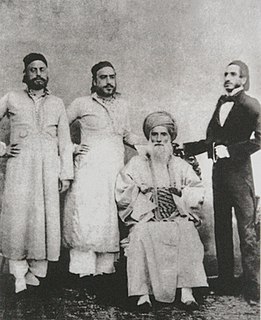
David Sassoon & Co., Ltd. was a trading company operating in the 19th century and early 20th century predominantly in India, China and Japan.

Gibb, Livingston & Co., known in Chinese as Jinkee or Renji, was one of the most important and best-known foreign trading firms in China in the late 19th and the first half of the 20th century.
Joseph Frost Edger was a British leading merchant in China and Hong Kong. He was one of the first Unofficial Member of the Legislative Council of Hong Kong.
Phineas Ryrie, JP was a Scottish tea merchant in Hong Kong. He was the Senior Unofficial Member of the Legislative Council of Hong Kong and the first Chairman of the Hong Kong Jockey Club.